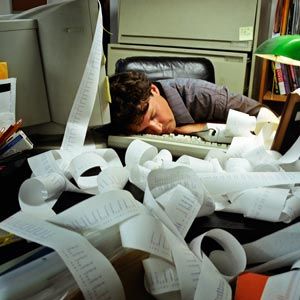Studies have shown a strong link between the quality of sleep and the risk in developing (or worsening) diabetes. A lack of deep and undisturbed sleep inhibits your body's ability to recognize normal insulin signals, which leads to high blood sugar levels, weight gain, and the development or worsening of type 2 diabetes. (One such study appears in the Proceedings of the National Academy of Sciences. )
It is important for people who have diabetes to maintain a normal schedule. Make an effort to keep consistent the times you sleep and take medication. Being well rested will decrease stress and keep you healthy.
Advertisement
Shift work may be more challenging if you have type 1 diabetes. Work with your diabetes educator or doctor to adjust your insulin accordingly, and try not to change shifts too often, if possible. If you work shifts and have type 2 diabetes, work with your doctor or diabetes educator to coordinate your meals and medicines.
If you have trouble falling asleep or maintaining sleep, awaken earlier than you wish, feel unrefreshed after sleep or suffer from excessive sleepiness during the day or when you wish to be alert, you should also consult your physician.
Here are some basic tips for better sleep from the National Sleep Foundation :
- Maintain a regular bed and wake time schedule, including weekends. Our sleep-wake cycle is regulated by a "circadian clock" in our brain and the body's need to balance both sleep time and wake time. A regular waking time in the morning strengthens the circadian function and can help with sleep onset at night. That is also why it is important to keep a regular bedtime and wake time, even on the weekends when there is the temptation to sleep in.
- Establish a regular, relaxing bedtime routine, such as soaking in a hot bath or hot tub and then reading a book or listening to soothing music. A relaxing, routine activity right before bedtime conducted away from bright lights helps separate your sleep time from activities that can cause excitement, stress or anxiety which can make it more difficult to fall asleep, get sound and deep sleep or remain asleep. Avoid arousing activities before bedtime like working, paying bills, engaging in competitive games or family problem-solving. Some studies suggest that soaking in hot water (such as a hot tub or bath) before retiring to bed can ease the transition into deeper sleep, but it should be done early enough that you are no longer sweating or overheated. If you are unable to avoid tension and stress, it may be helpful to learn relaxation techniques from a trained professional. Finally, avoid exposure to bright light before bedtime because it signals the neurons that help control the sleep-wake cycle that it is time to awaken, not to sleep.
- Create a sleep-conducive environment that is dark, quiet, comfortable and cool. Design your sleep environment to establish the conditions you need for sleep — cool, quiet, dark, comfortable and free of interruptions. Also, make your bedroom reflective of the value you place on sleep. Check your room for noise or other distractions, including a bed partner's sleep disruptions such as snoring, light, and a dry or hot environment. Consider using blackout curtains, eye shades, ear plugs, "white noise," humidifiers, fans and other devices.
- Sleep on a comfortable mattress and pillows. Make sure your mattress is comfortable and supportive. The one you have been using for years may have exceeded its life expectancy — about nine or 10 years for most good-quality mattresses. Have comfortable pillows, and make the room attractive and inviting for sleep, but also free of allergens that might affect you and objects that might cause you to slip or fall if you have to get up during the night.
- Use your bedroom only for sleep and sex. It is best to take work materials, computers and televisions out of the sleeping environment. Use your bed only for sleep and sex to strengthen the association between bed and sleep. If you associate a particular activity or item with anxiety about sleeping, omit it from your bedtime routine. For example, if looking at a bedroom clock makes you anxious about how much time you have before you must get up, move the clock out of sight. Do not engage in activities that cause you anxiety and prevent you from sleeping.
- Finish eating at least two to three hours before your regular bedtime. Eating or drinking too much may make you less comfortable when settling down for bed. It is best to avoid a heavy meal too close to bedtime. Also, spicy foods may cause heartburn, which leads to difficulty falling asleep and discomfort during the night. Try to restrict fluids close to bedtime to prevent nighttime awakenings to go to the bathroom, though some people find milk or herbal, non-caffeinated teas to be soothing and a helpful part of a bedtime routine.
- Exercise regularly. It is best to complete your workout at least a few hours before bedtime. In general, exercising regularly makes it easier to fall asleep and contributes to sounder sleep. However, exercising sporadically or right before going to bed will make falling asleep more difficult. In addition to making us more alert, our body temperature rises during exercise, and takes as much as six hours to begin to drop. A cooler body temperature is associated with sleep onset. Finish your exercise at least three hours before bedtime. Late afternoon exercise is the perfect way to help you fall asleep at night.
- Avoid caffeine (e.g. coffee, tea, soft drinks, chocolate) close to bedtime. It can keep you awake. Caffeine is a stimulant, which means it can produce an alerting effect. Caffeine products, such as coffee, tea, colas and chocolate, remain in the body on average from three to five hours, but they can affect some people up to 12 hours later. Even if you do not think caffeine affects you, it may be disrupting and changing the quality of your sleep. Avoiding caffeine within six to eight hours of going to bed can help improve sleep quality.
- Avoid nicotine (e.g. cigarettes, tobacco products). Ingested close to bedtime, it can lead to poor sleep. Nicotine is also a stimulant. Smoking before bed makes it more difficult to fall asleep. When smokers go to sleep, they experience withdrawal symptoms from nicotine, which also cause sleep problems. Nicotine can cause difficulty falling asleep, problems waking in the morning, and may also cause nightmares. Difficulty sleeping is just one more reason to quit smoking. And never smoke in bed or when sleepy!
- Avoid alcohol close to bedtime. Although many people think of alcohol as a sedative, it actually disrupts sleep, causing nighttime awakenings. Consuming alcohol leads to a night of less restful sleep.
Written by Bobbie Hasselbring
Reviewed by Beth Seltzer, MD
Last updated June 2008
Advertisement











